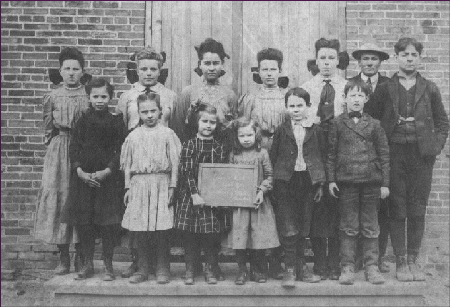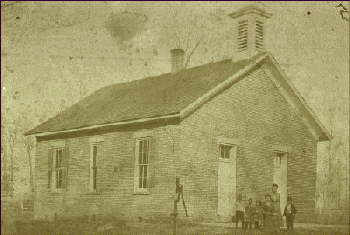
"On or about the first day of a
November nearly fifty years since, on a cold winter morning, with plenty of snow on the
ground, in school district No. 4, Salem township, Shelby county, there answered to roll
call sixty-one scholars, large and small, ranging in age from the six year old urchin to
the twenty year old, six foot giant.
The most important qualification of teachers in those days was their dexterity in the
wielding of the birch, and their astuteness in the detection of boys who were unfortunate
enough to be discovered in the breaking of some of the numerous rules read in the hearing
of all the pupils on the opening day of school by the teacher, and approved by the Board
of Directors, for the governing of the school during the term for which the teacher was
employed. The teacher’s wages ranged in amount from $15 to $25, and board thrown in.
Teachers boarded ‘round;’ that is, each patron was required to give
entertainment to the teacher one week at a time until the complete circuit of the district
was made; then start again at the beginning of the circuit, and so continue throughout the
term. These duties were cheerfully assumed by the good housewives, especially when the
teacher was good company, could crack his joke and was able to eat a hearty meal, thus
indicating to the housekeeper his appreciation of her good cooking, and a hint dropped
occasionally that her good cheer was a ‘leetle’ superior to that which he had
been compelled to endure, just a few weeks prior, at another neighbor’s just across
the fields."
"I
remember this morning of the first day. We were all on the ground early, more for the
purpose of sizing up the teacher than a desire for study.
In due course of time, this great personage
hove in sight, astride a great, ambling, bony, gray horse, with a long striped carpet sack
hanging from the horn of the saddle, well filled with a few books and other appliances and
clothing sufficient for a winter campaign....We then all assembled in the old school
house, crowded in almost as thick as sardines in a box. There were no backs to any of the
seats, and if our legs did not happen to be long enough to reach the floor, circulation
could be kept up by gently swinging them back and forth, the rapidity of the motion always
being gauged by the length of the leg, like the pendulum of a clock.
First in order that morning was the taking of the names and ages of the scholars; next
as to qualifications—who could spell and read, write and cipher. There were three
young men in attendance on that day who were giants in size—Bill A. Roberts, A.A.
Dunston and Bill Day. The first two had ciphered as far as the single rule of three, but
had neglected to learn the multiplication table... The teacher humiliated them to the
extent that they could do no more ciphering until the table was thoroughly learned and
could be repeated from start to finish, which they proceeded to do with protest. Poor Bill
Day, upon examination, was found to be absolutely illiterate; the letters of the alphabet
to him were as unknown and as mysterious as the translation of Virgil would be to a Sioux Indian. When noon came Bill put on his hat
and left the house, and never returned to attend school again in that district.
This was about all that was accomplished that first forenoon, and we were then
dismissed for dinner. All having brought our baskets with us, we proceeded to satisfy
appetites which were whetted up to proportions commensurate with the amount of provender
furnished by mothers who were adepts in this line. Soon after the noon hour had passed the
teacher called school to order by repairing to the rear end of the school house, and with
a long paddle, made from a clap board, and used for various purposes, among others in
removing ashes from the large iron stove, which occupied the center of the room, and in
calling the school from play to study, gave three resounding raps on the weather boarded
gable, and, with roars from his mouth of ‘Books!’ ‘Books!’ which could
be heard a much further distance than the braying of any mule in all the surrounding
country. Two of the school Directors, in the meantime, had made their appearance, and
after the school had all quieted down the teacher announced that the ‘rules’ of
the school would now be read...and commenced in a drawling, monotonous tone of voice to
read something about as follows... "Rule 1—School will take up at 8
o’clock, and continue in session until 12 m., and then be dismissed for dinner. Rule
2—School will take up at 1 p.m., and close for the day at 4 p.m. Rule 3—No
whispering will be allowed during the sessions of school. Rule 4—No loud or
boisterous talk in the school room during dinner. Rule 5—No snow balling at noon or
play time, or on the road to and from the school. Rule 6—No profanity or vulgarity
will be permitted at noon on the school grounds…"

"Rule 7—No fighting, quarrelling
or wrangling will be permitted on the school ground...Rule 8—The teacher will have
control of all pupils after leaving home in the morning until their return home in the
evening. Rule 9—No jumping on sleighs or sleds will be permitted by any pupil at
noon, or in coming to school or returning home.
One morning about three weeks after school had begun we noticed the teacher approaching
the school house from the beech woods...with at least four very formidable looking long
beech gads under his arm, trimming one off and smoothing it up as he walked, all of which
looked, to say the least, a very suspicious circumstance, and soon went far in proof of
the fact that our pedagogue was a past master in the wielding of the birch; in fact, he
from thenceforth believed not in the sparing of the rod."
[ Back to Education Index ] |

